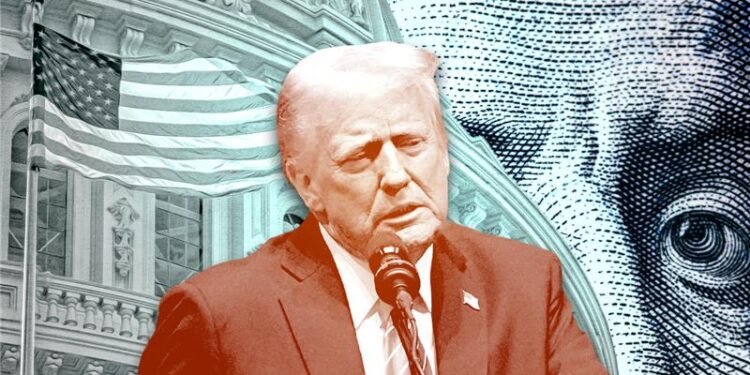
Democrats are sounding the alarm over President Trump’s move to freeze funding approved in two of President Biden’s signature laws.
Trump issued an executive order pausing the disbursement of funds appropriated through the Inflation Reduction Act and the Bipartisan Infrastructure Law.
Democrats say Trump’s order appears to violate a law called the Impoundment Control Act (ICA), which lays out limits on how much power a president has to restrict funding approved by Congress.
Rep. Rosa DeLauro (Conn.), the top Democrat on the House Appropriations Committee, bashed the measure this week as “illegally impounding” critical investments, while adding “uncertainty to every company, nonprofit organization, and state and local government that has any stake in either of those laws.”
Republicans, meanwhile, are dismissing the attacks, defending Trump’s moves as within his powers as president while also noting plans to yank back some of the funding anyway.
“Clearly, we’re going to try to claw back funds there,” Sen. John Hoeven (R-N.D.), a spending cardinal, told The Hill this week. “We made that very clear, and that’s something we look at doing in budget reconciliation.”
“For the president to pause that, I mean, he has executive authority, so he has some discretion in that realm,” he argued.
Part of the issue is that it’s not clear exactly what is included in Trump’s order. The laws fund a wide variety of matters, including tax credits for low-carbon energy projects, consumer rebates for technology to make homes more climate-friendly, grants aimed at cutting pollution, and funds for roads, bridges and electric vehicle chargers.
The White House issued a memo Wednesday saying the pause only applies to funds “supporting programs, projects or activities that may be implicated by the policy established” in a certain section of the executive order.
That section of the order states, among other things, that it is U.S. policy to “eliminate the ‘electric vehicle (EV) mandate’ … by ensuring a level regulatory playing field for consumer choice in vehicles” and that it is policy to “safeguard the American people’s freedom to choose from a variety of goods and appliances … and to promote market competition and innovation within the manufacturing and appliance industries.”
But it’s still murky what exactly that applies to — and whether it includes money committed by the federal government that hasn’t officially been released.
“They’re just badly written and Republican and Democratic states alike have been trying to sort through what the hell this executive order meant,” Sen. Sheldon Whitehouse (D-R.I.) said. “There was an initial clarification that didn’t provide much clarification.”
Nevertheless, some climate advocates still expressed concerns about what the ultimate impact of Trump’s moves will be.
“We made a ton of progress in the last four years, and I think he has the potential to really set us back at a time when we can’t afford that,” said Patrick Drupp, the director of climate policy at the Sierra Club.
The partisan dispute has only intensified in recent days; Democrats have also seized on the order in the Senate as Republicans work to install Russell Vought, Trump’s former budget chief, atop the Office of Management and Business once more.
“He’s been leading the charge on impoundment of funds,” Senate Minority Leader Chuck Schumer (D-N.Y.) said to reporters Thursday, arguing that Vought “could decide what funds that we allocated could go forward” and raising concerns around “the danger of impoundment.”
The remarks came during a press conference held by Senate Democrats targeting Vought’s nomination, in which one senator described him as “the most dangerous nominee put forward by Trump.”
Democrats have also grilled Vought on previous actions under the Trump administration to freeze security assistance for Ukraine, particularly as the president draws heat from the party over a recent move targeting foreign assistance.
During his testimony before senators this week, Vought defended Trump’s efforts to freeze the funding, saying it’s meant to “do a programmatic delay,” though the nominee also reiterated his stance that the ICA is unconstitutional.
“We will faithfully uphold the law,” Vought said. “The president ran on the notion that the Impoundment Control Act is unconstitutional. I agree with that.”
Hard-line conservatives have also taken up the issue in recent months, ramping up calls for the measure’s repeal. GOP critics say the measure is unconstitutional and that its rollback would help Trump pursue further cuts to government spending.
However, other Republicans have stopped short of cosigning the idea.
“I think it has limitations, and I think there would be disagreement, probably between the executive and Congress, as far as what you can and can’t do with it,” Hoeven said.
Asked whether he thought the ICA was unconstitutional, Sen. John Kennedy (R-La.), another spending cardinal, also said one “can argue the constitutionality or the unconstitutionality.”
“But it’s circumstance specific. It’s fact specific,” he argued. “You just can’t say, you can’t say just generally as a sweeping proposition that the president can’t hold up spending that has not been obligated. It’s very case specific.”
However, in this case, some experts are crying foul.
“Pausing disbursements of already locked-in contracts is a contract violation,” argued Bobby Kogan, a former Senate budget aide and senior director of Federal Budget Policy at American Progress, on Thursday. He also pointed to sections of the impoundment law that gives the president authority to pause obligations.
“In 2018, Trump tried the legal path,” Kogan said, noting he “tried to legally rescind some unobligated balances of budget authority during that time period. He is allowed to legally pause, not all disbursements, but legally pause new obligations from happening.”
“That is super legit — that’s not what they’re doing,” he said, while also arguing Trump’s previous actions on withholding assistance for Ukraine was “the illegal path, and then in 2025 he is, once again, doing an illegal path.”







